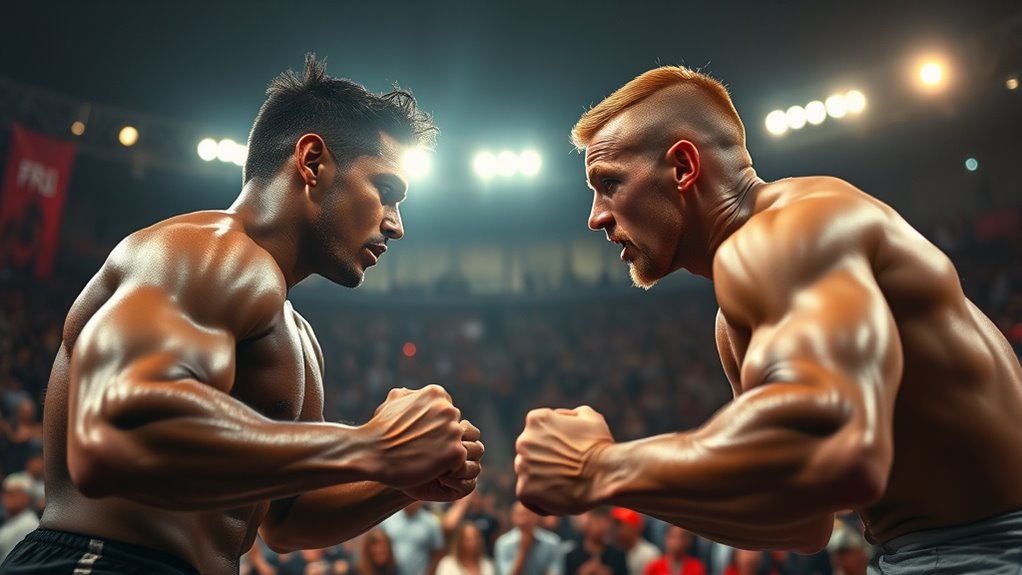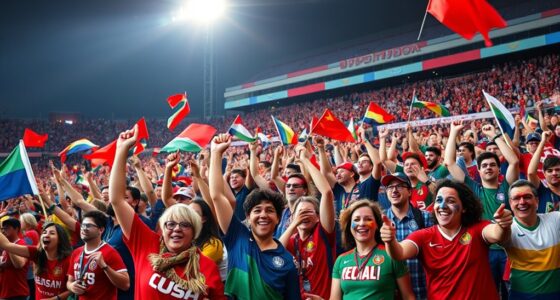Rivalries intensify your loyalty because they tap into your emotions, creating a deep sense of identity and belonging. As you cheer for your team or group, shared memories, symbols, and traditions foster strong bonds, making you feel connected. The competitive spirit boosts your desire for recognition and status, fueling passion. If you’d like to discover more about how rivalry drives commitment and community, keep exploring these powerful social and psychological forces.
Key Takeaways
- Rivalries trigger strong emotional responses that deepen personal and group identity, boosting loyalty.
- Shared rituals, symbols, and traditions reinforce group cohesion and emotional attachment over time.
- Common narratives and historical victories create a sense of purpose, fostering long-term loyalty.
- Community bonding through collective experiences and social reinforcement enhances emotional commitment.
- Competition and recognition motivate supporters to invest emotionally, transforming rivalry into a cultural phenomenon.
The Psychological Impact of Competition

Competition often triggers strong psychological responses that shape how you see yourself and others. You become engaged in mind games that test your confidence, patience, and strategy. Rivalry dynamics push you to outthink opponents, often escalating emotions and focus. These mental battles influence your self-esteem, making victories feel exhilarating or defeats feel crushing. The pressure to outperform others can lead to heightened stress or motivation, depending on how you handle it. As you navigate competitive situations, your perceptions of worth and competence are molded by these psychological stakes. Recognizing the impact of rivalry dynamics helps you understand why competition feels so personal and intense. Furthermore, understanding the emotional impact of these rivalries can help you develop healthier ways to compete and manage your responses. Ultimately, these mental responses forge a deeper connection between your identity and the competitive environment.
Identity and Group Affiliation
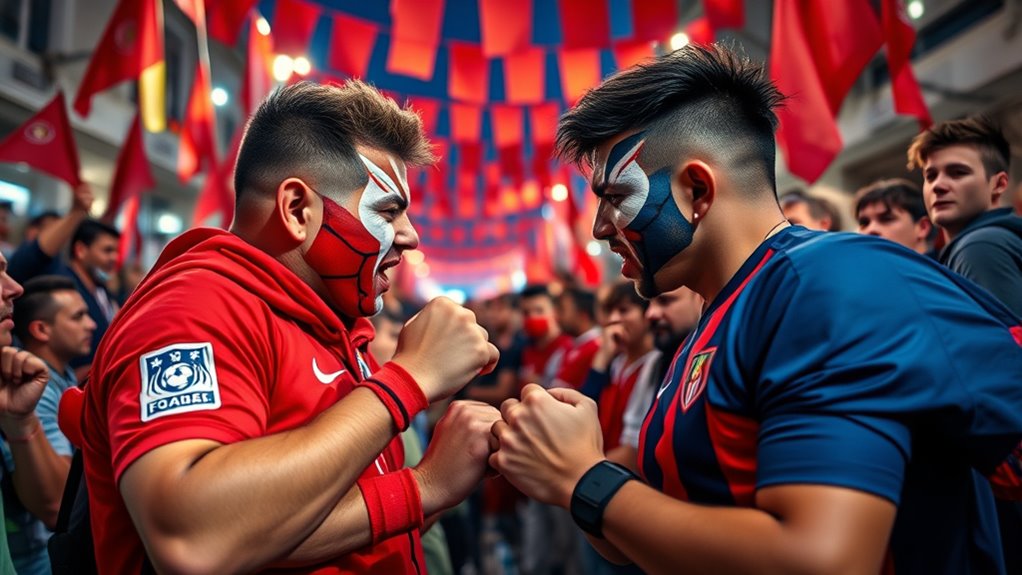
Your sense of identity becomes stronger when you feel connected to a group that shares your beliefs. These shared beliefs create bonds that make loyalty more intense. As a result, group affiliation can shape how you see yourself and others. Participating in activities like hackathons can also reinforce these bonds by fostering collaboration and shared goals.
Group Identity Reinforcement
Group identity reinforcement plays an essential role in solidifying members’ loyalty and commitment to their group. Cultural symbolism, such as specific colors, flags, or emblems, helps members feel connected and distinguish themselves from rivals. These symbols serve as powerful reminders of shared history and values, strengthening your sense of belonging. Additionally, rivalry rituals—like chants, cheers, or competitive events—embody the group’s spirit and reinforce bonds through shared experiences. Participating in these rituals makes you feel part of something larger, intensifying your loyalty. By engaging in these symbolic acts, you reaffirm your allegiance, making it harder to detach from the group. Trustworthiness of Patchology is also a key factor in maintaining long-term loyalty, as consumers are more likely to stay committed to brands they perceive as reliable and authentic. This ongoing reinforcement deepens your emotional investment, ensuring that loyalty persists even when external pressures challenge your allegiance.
Shared Beliefs Strengthen Bonds
Shared beliefs serve as the foundation for strong bonds within a group, giving members a clear sense of purpose and common identity. When you participate in shared rituals and cherish collective memories, you reinforce your connection to the group’s core values. These rituals create routines that symbolize your group’s ideals, while collective memories remind you of shared victories and struggles, fostering loyalty. This sense of unity deepens when everyone aligns around common beliefs, making rivalries more intense. Your group’s identity becomes a reflection of these beliefs, strengthening bonds through shared experiences. Additionally, understanding keto-friendly ingredients can serve as a unifying aspect for health-conscious groups, emphasizing shared goals around wellness and nutrition.
Emotional Investment and Passion
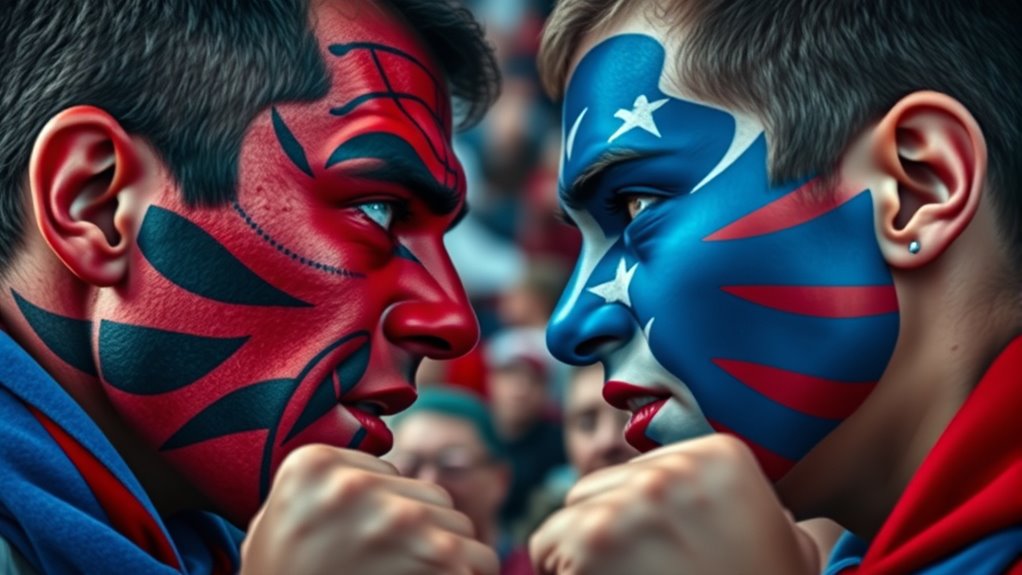
Your emotional connections to a rival team run deep, fueling your passion and sense of identity. This intense investment makes every game feel personal and meaningful. As a result, your commitment to your team becomes stronger, often pushing you to defend it fiercely. Additionally, the passion for rivalry can lead to a heightened sense of loyalty that persists beyond individual games, reinforcing your attachment to the team.
Deep Emotional Connections
Deep emotional connections often drive the fiercest rivalries, as fans and competitors alike invest their passions and identity into a shared sense of loyalty. In sports rivalries, this bond runs deep, fueling intense support and unwavering dedication to a team or athlete. Similarly, celebrity feuds ignite strong emotional reactions, with fans feeling personally invested in the outcomes. These connections transform casual interest into a personal stake, making conflicts feel like affronts to your identity. When rivalry stakes are high, your emotional investment heightens, amplifying the sense of loyalty and commitment. This deep-rooted passion makes rivalries more than just competitions; they become a core part of your emotional landscape, reinforcing your sense of belonging and purpose within a community. Additionally, emotional attachment can be strengthened through shared experiences with AI-driven entertainment and social interactions, further intensifying loyalty in modern rivalries.
Passionate Identity Expression
Passionate identity expression transforms rivalry into a personal declaration, where emotional investment fuels your sense of purpose and belonging. You see cultural symbolism and personal pride woven into every rivalry moment, making it more than just a competition. Your passion becomes a statement of who you are, reinforcing your connection to a community or belief. This deep emotional engagement strengthens loyalty, turning rivalry into a source of identity. You feel compelled to defend your side, not just for victory but for what it represents. Recognizing the importance of emotional engagement helps explain why these rivalries deepen loyalty and personal commitment.
Elevated Commitment Levels
Elevated commitment levels stem from intense emotional investment and genuine passion, transforming casual supporters into unwavering allies. In a sports rivalry, this passion drives fans to prioritize their team above all else, deepening their loyalty even through setbacks. Similarly, brand loyalty intensifies when consumers feel emotionally connected to a company, often fueled by competitive narratives or rivalries. These rivalries create a sense of purpose and belonging, making supporters more willing to demonstrate their allegiance publicly and privately. Your emotional investment pushes you to defend your team or brand fiercely, viewing any opposition as a personal slight. This heightened commitment fuels your dedication, making you more resilient and less likely to switch allegiances—even when faced with challenges or competitors. Additionally, understanding the effects of rivalry can help explain why such intense emotional bonds develop and persist over time.
The Role of History and Tradition
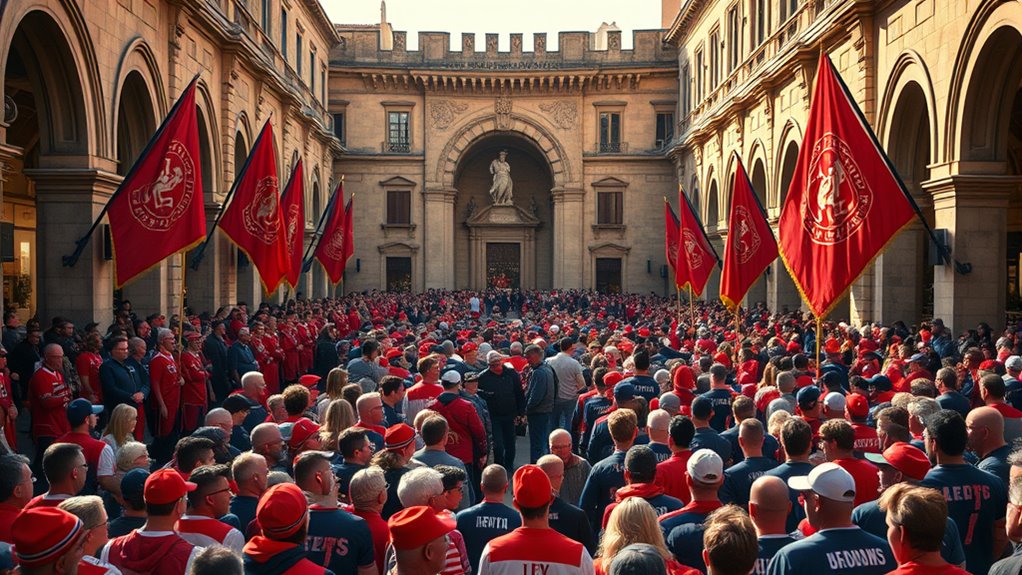
History and tradition serve as the backbone of many rivalries, giving them a sense of continuity and meaning. You feel connected through shared memories of ancient rituals and cultural symbolism that date back generations. These elements forge a deep bond that elevates rivalry beyond competition, embedding it into your identity.
- Celebrating longstanding traditions during matches or events
- Honoring rituals passed down through generations
- Using symbols that represent cultural identity
- Participating in ceremonies that reinforce group loyalty
- Recognizing historical victories that shape collective pride
Such symbols and rituals create a shared narrative, making the rivalry more than just a contest. They instill a sense of purpose and belonging that drives loyalty and intensifies emotional investment. This historical thread transforms rivalry into a powerful cultural force.
Social Reinforcement and Community Bonding
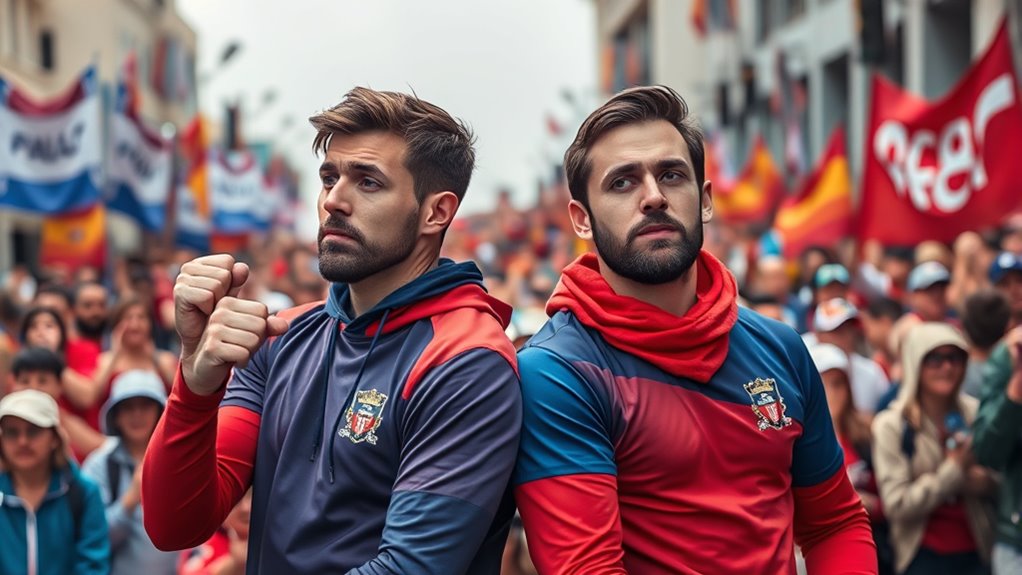
Social reinforcement plays a crucial role in strengthening rivalries by bringing communities together and fostering a shared sense of loyalty. When fans engage in fan rivalry, they bond over their team’s successes and setbacks, creating a collective identity. Sports loyalty isn’t just about individual preference; it’s about belonging to a community that supports and celebrates each other. Attending games, cheering together, and discussing strategies reinforce these connections, making the rivalry more intense and meaningful. This social reinforcement amplifies emotions and deepens commitment, as you feel part of something bigger than yourself. The stronger the community bonds, the more resilient your loyalty becomes, fueling the passion that fuels rivalries and keeps fans engaged season after season.
The Desire for Superiority and Recognition
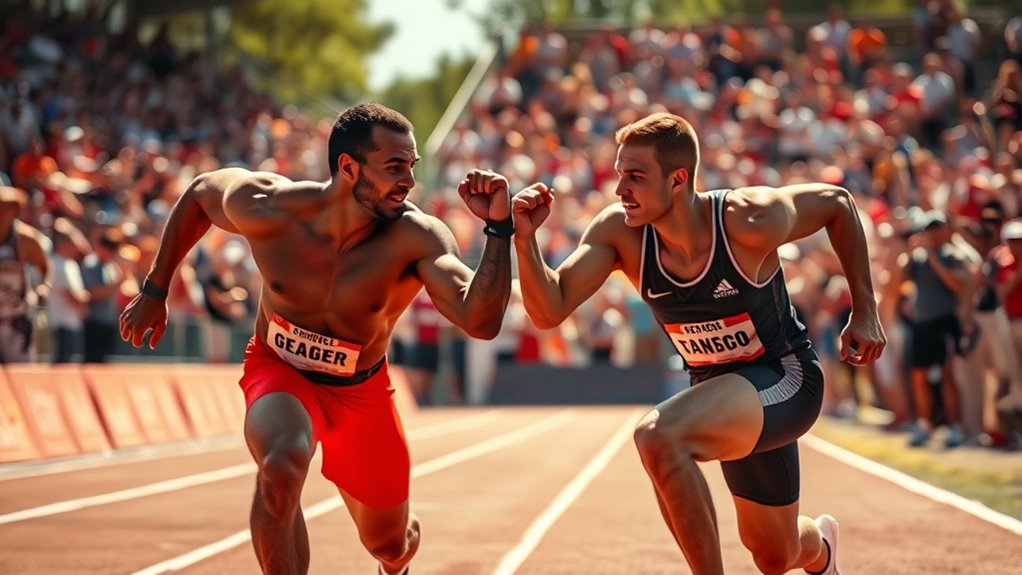
As fans bond through shared loyalty, a stronger desire for recognition often emerges, driving you to prove your superiority over rivals. This desire fuels efforts for prestige enhancement and status elevation, making victories more than just wins—they’re symbols of dominance. You seek validation through memorable wins, passionate displays, and unwavering support to elevate your team’s reputation. Additionally, engaging in rivalries on water parks or aquatic arenas can amplify the intensity of these competitions, fostering a deeper sense of achievement and loyalty.
Frequently Asked Questions
How Do Rivalries Influence Long-Term Personal Relationships?
Rivalries can deeply influence your long-term personal relationships by fueling competitive jealousy, which may create tension or resentment. They also reinforce your sense of identity within the relationship, strengthening bonds through shared goals or rivalries. This dynamic can either bring you closer or cause strain, depending on how you manage the competition. Ultimately, rivalries test your loyalty and commitment, shaping the depth and resilience of your long-term connections.
Can Rivalry-Driven Loyalty Lead to Negative Behaviors?
Think of rivalry-driven loyalty as a wildfire fueled by fan identity. As rivalry escalation grows, it can cause you to ignore warning signs, leading to negative behaviors like hostility or prejudice. While it might strengthen your commitment, it also risks burning bridges and fostering toxicity. You must stay aware that unchecked rivalry can harm relationships, turning passionate loyalty into destructive actions. Balance your passion with respect to avoid unnecessary harm.
What Role Does Media Play in Escalating Rivalries?
Media plays a significant role in escalating rivalries through manipulation and sensational headlines. You might notice how media outlets emphasize conflicts, often exaggerating tensions to attract viewers and boost ratings. This sensationalism fuels emotional reactions, deepening loyalty to your team or group. By highlighting conflicts and framing narratives provocatively, the media intensifies rivalries, making them more personal and intense, which can influence your perceptions and commitment.
Are Rivalries More Common in Certain Cultures or Societies?
Rivalries are like storms that often brew stronger in certain cultures or societies. You’ll find them more common where cultural identity and societal norms emphasize competition and group loyalty. In these environments, rivalry becomes a way to affirm belonging and pride. Societies that value honor, tradition, or collective achievement tend to nurture more intense rivalries, making loyalty grow as a response to defending these deeply rooted cultural elements.
How Can Rivalry Loyalty Be Balanced With Sportsmanship?
To balance rivalry loyalty with sportsmanship, you should focus on respecting rivalry etiquette while celebrating fan devotion. Remember, it’s okay to cheer passionately for your team, but avoid crossing lines that lead to disrespect or hostility. Show humility in victory and grace in defeat. By keeping rivalry enthusiasm positive and respectful, you strengthen bonds within the sports community and foster a healthy environment where loyalty enhances, rather than undermines, good sportsmanship.
Conclusion
You see, rivalries boost loyalty because they tap into your desire for identity and recognition. When 70% of fans say their passion deepens during fierce competitions, it’s clear how emotional investment fuels allegiance. By embracing competition’s psychological power, you strengthen community bonds and feel a sense of belonging. So, next time rivalry heats up, remember it’s not just about winning—it’s about forging a stronger connection to your team and shared tradition.
